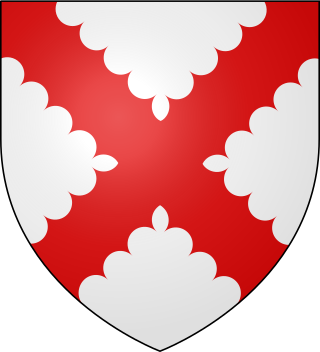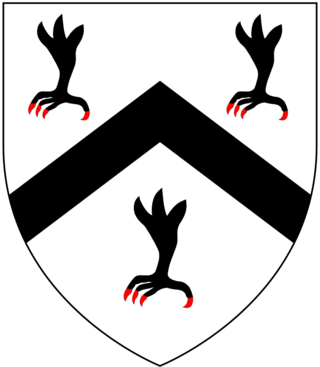
John Norbury (died 1414) of Hoddesdon and Little Berkhamsted in Hertfordshire, was an English courtier, ambassador and Member of Parliament who served as Lord High Treasurer of England. [1]

John Norbury (died 1414) of Hoddesdon and Little Berkhamsted in Hertfordshire, was an English courtier, ambassador and Member of Parliament who served as Lord High Treasurer of England. [1]
He was a younger son of Thomas Norbury of Nantwich in Cheshire.
After serving as a soldier in France in the service of the Duke of Brittany in 1368 he was made deputy Captain of Brest (1382–1397) and Captain of Guînes (1399–1401) with responsibilities for maintaining the truce between England and France. He served as a Member of Parliament for Hertfordshire in 1391. During this time he allied himself with Henry Bolingbroke, the future King Henry IV.
When Bolingbroke ascended the throne Norbury was made Lord High Treasurer of England (1399–1401), Keeper of the Privy Wardrobe (1399–1405) and a member of the Privy Council. In 1406 he was acting as an ambassador to negotiate a further truce with the French.
He married twice:
He died in 1414 and was buried at the Greyfriars, London.

Henry Marney, 1st Baron MarneyKG of Layer Marney, Essex was a politician of the Tudor period in England. He was a favourite of Henry VIII and captain of his guard.
Sir John Say was an English courtier, MP and Speaker of the House of Commons.

John Tiptoft, 1st Baron Tiptoft was a Knight of the Shire for Huntingdonshire and Somerset, Speaker of the House of Commons, Treasurer of the Household, Chief Butler of England, Treasurer of the Exchequer and Seneschal of Landes and Aquitaine.

Edmund Braye, 1st Baron Braye, of Eaton Bray in Bedfordshire, was an English peer.

John Stourton, 1st Baron Stourton of Stourton, Wiltshire, was an English soldier and politician, elevated to the peerage in 1448.
Sir Robert Belknap was a senior English judge.

John Montagu, 3rd Earl of Salisbury and 5th and 2nd Baron Montagu, KG was an English nobleman, one of the few who remained loyal to Richard II after Henry IV became king.
Sir Robert Corbet was an English landowner, Member of Parliament (MP) and High Sheriff.
Nicholas Merbury was an English administrator, Member of Parliament and first Master of the Ordnance.

Sir John Howard, of Wiggenhall and East Winch, in Norfolk, England, was a landowner, soldier, courtier, administrator and politician. His grandson was John Howard, 1st Duke of Norfolk, the great-grandfather of two queens, Anne Boleyn and Katherine Howard, two of the six wives of King Henry VIII.
Robert Waterton was a trusted servant of the House of Lancaster under three monarchs, Henry IV, Henry V, and Henry VI. As Constable of Pontefract Castle, he had custody of Richard II after that king was deposed.
Sir Hugh Waterton, was a trusted servant of the House of Lancaster.
Sir Walter Devereux of Bodenham and Weobley was a prominent knight in Herefordshire during the reigns of Richard II and Henry IV. He represented Hereford in Parliament, and gave rise to the Devereux Earls of Essex and Viscounts of Hereford.

Sir William Moleyns was an English landowner, administrator and politician from Stoke Poges in Buckinghamshire.
Sir Francis Vincent, 7th Baronet, of Stoke D'Abernon, was an English country landowner and politician who sat in the House of Commons from 1761 to 1775.
John Waterton was an English landowner, administrator, courtier, diplomat, and politician who sat in the Parliament of England.
Sir John Russell, of Strensham in Worcestershire where he held the manor and advowson, was an English landowner, soldier, administrator, courtier and politician.

Henry Norbury of Hoddesdon and Little Berkhamsted in Hertfordshire, was an English soldier and nobleman who served as a Member of Parliament for Bedfordshire in 1454 and later again in 1454.

The Church of St Mary is an Anglican church in the village of Stoke d'Abernon, Surrey, in the Diocese of Guildford. The church, the oldest parts of which date from the 7th century, is a Grade I listed building.
Sir John de Pelham was an English parliamentarian who served as Treasurer of England.